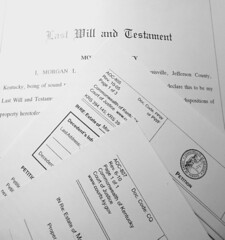Probate is a court-supervised process through which the provisions of a person’s will are carried out. Many people choose to avoid probate by employing various estate planning tools that transfer their assets outside of their will. As a recent article explains, an additional benefit of creating non-probate transfers is that they provide a level of asset protection.

If a person’s estate goes through probate, his or her executor will begin the process by collecting the decedent’s assets and giving notice of the death to any potential creditors. After this notice is given, the decedent’s creditors will have a specified amount of time to make any claims against the estate. The executor will have to pay these claims through the estate before distribution to the heirs.
Alternatively, certain non-probate assets such as life insurance policies, beneficiary accounts, and items held in joint tenancy pass immediately to the beneficiary or joint tenant upon the decedent’s death. Therefore, creditors are often unable to reach these assets.
Although non-probate transfers are a great way to incorporate asset protection planning into your estate plan, it is important not to use non-probate transfers specifically to avoid a particular creditor. These transfers can be undone if a court finds that the transfer was made for the sole purpose of avoiding an existing obligation to a creditor.


